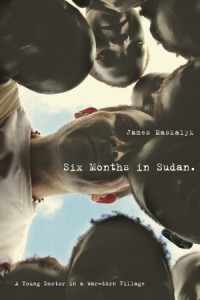I made a friend today!
I was coming back home after a very long and arduous ordeal of crashing on campus for the night and waking up at 6:30AM to help volunteer for the Food for All: Food Security and Poverty Conference. The conference itself was informative, fun, and an overall great experience. It just left me insanely tired by the time it was done.
So here I am, finally on the skytrain ride home when I meet Deng.
I have a seat to myself, and he sits in the seat in front of mine. Barefoot, tall, and lanky, he smiles at me and greets me. So of course I smile back. I guess I was still in a social mood from the conference because I start telling him how exhausted I am. He says he’s tired too, and he’d love a massage – but he can’t afford one. So we start talking. His english is somewhat hard to understand but with patience, I get the general gist of what he says to me.
Deng is Sudanese. He came to Canada alone, leaving his mother, sister, and girlfriend behind in Sudan. When I ask him how long he’s been in Canada, he replies ‘a very long time’. I can gather from the brief snippets of his story that he came to Canada to find work to most likely send money back home in order to support his family. Maybe a refugee. I had learned about African men coming to more developed nations in my studies, but actually meeting Deng and hearing his story was an entirely different experience.
I ask him if he is lonely, being all by himself in Canada. He tells me he is. When I ask him where he is off to right now, he tells me he is just riding the skytrain back and forth because he doesn’t want to go home where he would be by himself. He tells me he often gets drunk to fall asleep quicker. I listen with an open ear. Here is a fellow human being, going through his own hardships like everyone else. Although I can’t ever imagine what he’s been through – I can empathize with (if only maybe a little of the extent of) the loneliness he feels. No one wants to feel alone in the world.
So I do what the people in my life do for me. I talk with him. This simple human interaction is the only thing I can offer Deng, just like I would offer any other person who welcomes my company. Even though we have only just met, it’s incredible how friendly and warm he is as we talk. Not at all like strangers.
He greeted me pleasantly, and I greeted him back. This isn’t an act of charity or good will. This is the start of a friendship.
I keep asking him questions from what kind of music he likes to what he spends his spare time doing. He tells me stories with an animated expression. He tells me the vision he has for wanting to start a family and how he would raise his kids (a boy and a girl). I listen and then tell him about my studies at UBC and then listen some more.
Eventually, I reach my stop and we have to part ways. I’m actually a little sad that the skytrain ride is so short – he was so interesting to listen to. He says I’m interesting too.
He offers to give me his email address, and I figure it won’t hurt to keep in touch to chat. When I reach my stop, we shake hands as friends, not strangers.
We hope we meet again one day.

